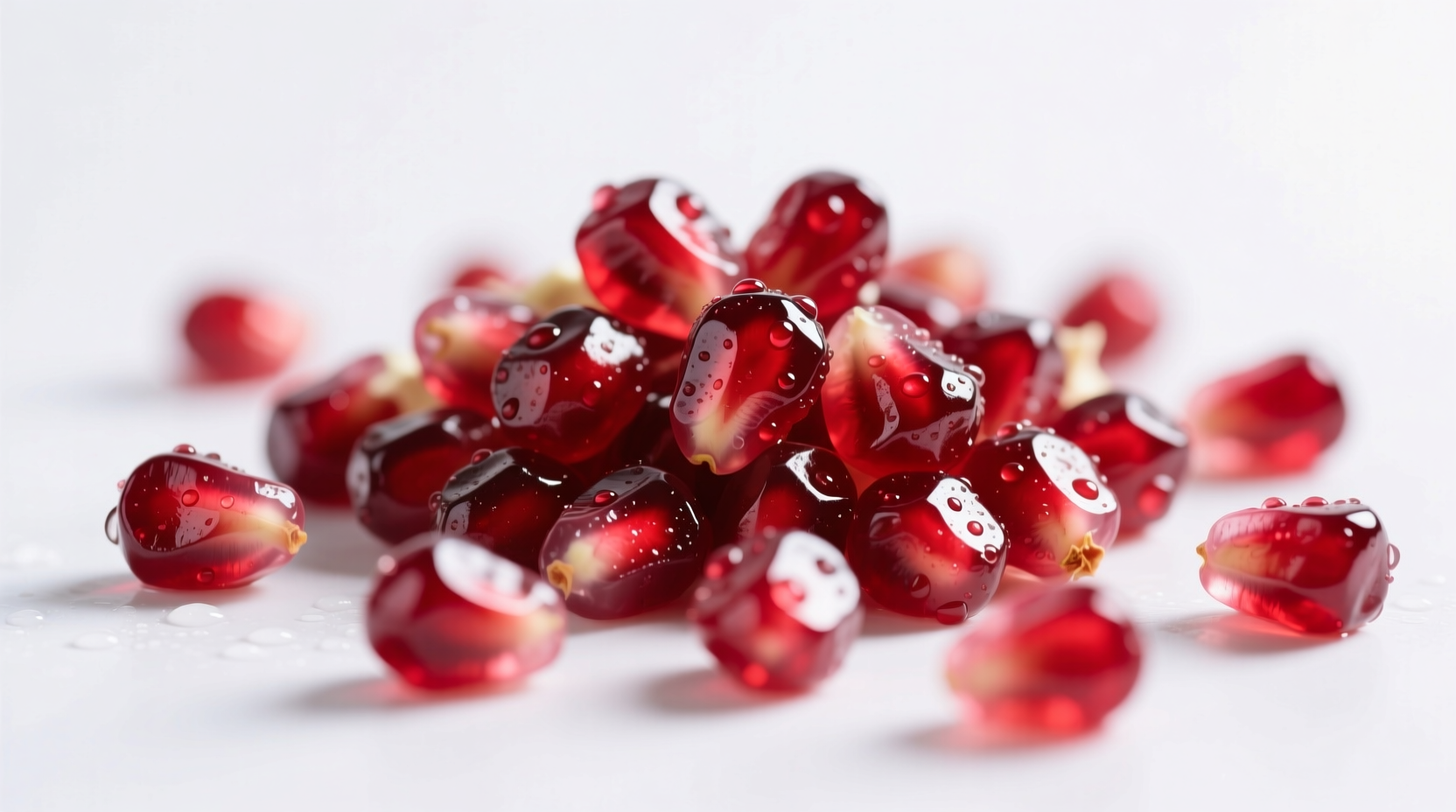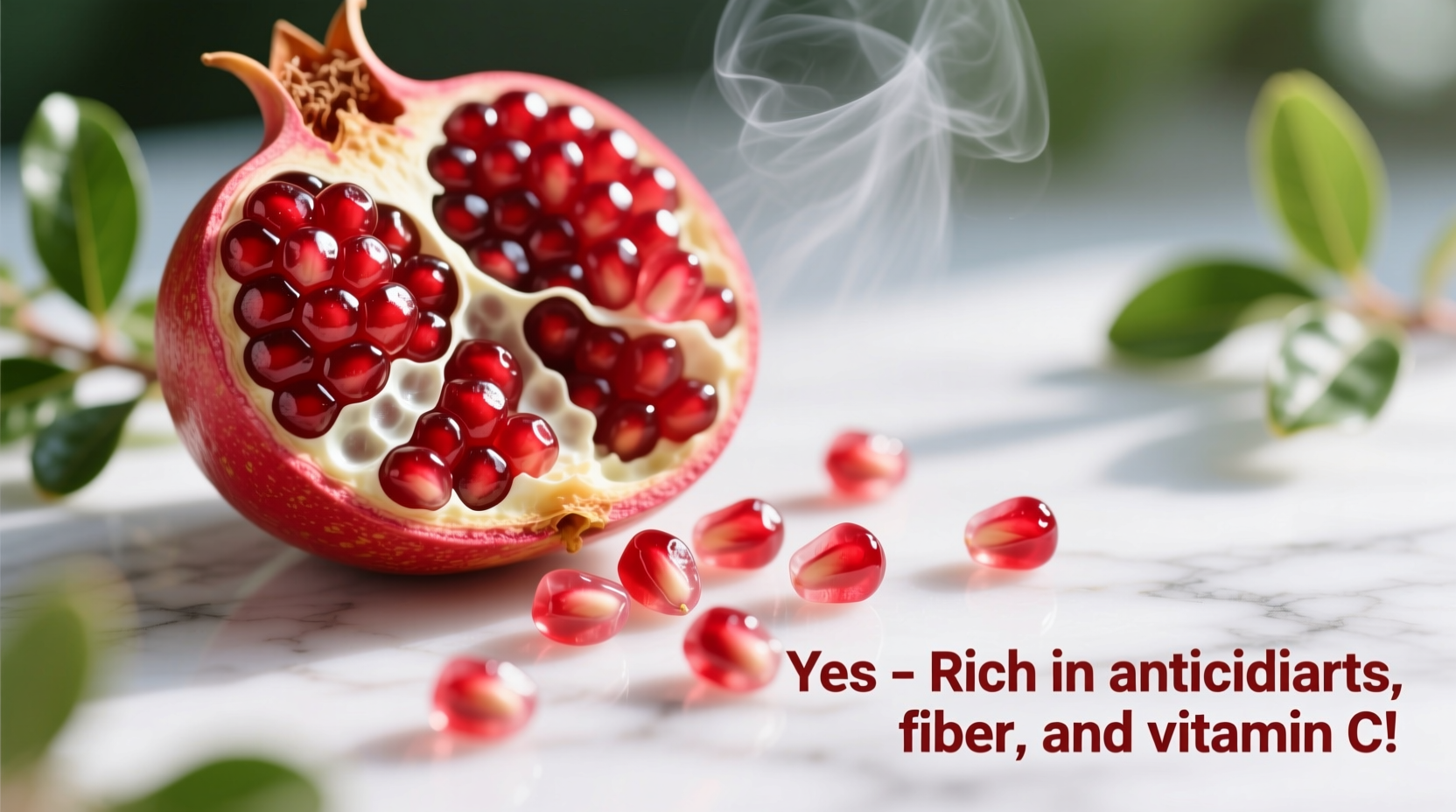Many people mistakenly spit out pomegranate seeds after enjoying the juicy arils, not realizing they're discarding one of nature's most potent superfoods. Let's explore why incorporating the entire seed into your diet delivers maximum health benefits.
Why Pomegranate Seeds Deserve a Place in Your Diet
Pomegranate seeds contain powerful compounds that work synergistically to deliver health benefits you can't get from juice alone. The white pith and crunchy seeds house valuable fiber and polyphenols that get lost during juicing. Research from the National Institutes of Health confirms that whole-seed consumption provides significantly higher antioxidant activity than processed juice.
| Nutrient | Pomegranate Seeds (100g) | Blueberries (100g) | Orange (100g) |
|---|---|---|---|
| Dietary Fiber | 4g | 2.4g | 2.4g |
| Vitamin C | 10.2mg | 9.7mg | 53.2mg |
| Antioxidant Capacity (ORAC) | 2,341 μmol TE | 9,621 μmol TE | 2,103 μmol TE |
| Polyphenols | High (punicalagins) | Moderate (anthocyanins) | Low |
Data sourced from USDA FoodData Central shows pomegranate seeds offer unique nutritional advantages. While they contain less vitamin C than oranges, their polyphenol profile—particularly punicalagins—delivers exceptional antioxidant protection that combats oxidative stress more effectively than many common fruits.
Practical Ways to Enjoy Pomegranate Seeds
Extracting pomegranate seeds properly ensures you maximize nutritional benefits while minimizing mess. Try these chef-approved techniques:
- The underwater method: Cut the fruit into quarters, submerge in a bowl of water, and gently loosen seeds—this prevents splattering while keeping seeds intact
- Direct extraction: Score the skin into sections, then bend outward to expose seeds for easy removal
- Storage tip: Keep seeds in an airtight container for up to 5 days or freeze for longer storage

Addressing Common Concerns About Seed Consumption
Despite their benefits, certain individuals should exercise caution with pomegranate seeds:
Who Should Moderate Pomegranate Seed Intake
- People with digestive sensitivities: Those with irritable bowel syndrome or diverticulitis may experience discomfort from the fibrous seeds
- Individuals on specific medications: Pomegranate can interact with blood pressure medications and statins—consult your physician
- Young children: Supervise consumption to prevent choking hazards from the crunchy seeds
According to the FDA's dietary guidelines, whole fruit consumption is generally preferred over juices, but those with specific digestive conditions should adjust based on individual tolerance.
Maximizing Nutritional Benefits
To get the most from pomegranate seeds, consider these evidence-based strategies:
- Pair with healthy fats: Combine with avocado or nuts to enhance absorption of fat-soluble antioxidants
- Add to cooked dishes: Sprinkle over roasted vegetables or grain bowls—the heat helps release additional nutrients
- Create seed-infused oils: Gently crush seeds and steep in olive oil for salad dressings with added polyphenols
Recent research published in the Journal of Functional Foods demonstrates that consuming pomegranate seeds with complementary ingredients significantly increases bioavailability of beneficial compounds compared to eating them alone.
Historical Perspective on Pomegranate Consumption
Pomegranates have been consumed whole—including seeds—for thousands of years across multiple cultures:
- Ancient Egypt (1500 BCE): Seeds were placed in tombs as symbols of prosperity and used in medicinal preparations
- Mediterranean civilizations: Greek and Roman cultures consumed entire seeds for vitality and fertility
- Traditional Ayurveda: Seeds were recommended for digestive health and as a natural remedy for inflammation
- Modern science: Research confirms many traditional uses have biochemical foundations
This historical timeline shows consistent whole-seed consumption across diverse cultures, supporting contemporary nutritional recommendations.
Conclusion: Embrace the Whole Pomegranate Experience
Pomegranate seeds aren't just safe to eat—they're nutritional powerhouses worth incorporating into your regular diet. By consuming the entire seed, you access a broader spectrum of nutrients than juice alone provides. Start adding these ruby-red gems to your salads, yogurt, or smoothies to boost your antioxidant intake while enjoying their unique crunchy texture.
Can eating too many pomegranate seeds cause digestive issues?
While generally well-tolerated, consuming excessive amounts (more than 1 cup daily) may cause mild digestive discomfort in sensitive individuals due to the high fiber content. Most people can safely enjoy 1/2 cup daily without issues.
Do pomegranate seeds help with weight loss?
Pomegranate seeds support weight management through their high fiber content which promotes satiety, and polyphenols that may help regulate metabolism. A 1/2 cup serving contains only about 70 calories while providing significant nutritional value.
Are pomegranate seeds safe for children to eat?
Yes, but with supervision for children under 5 due to potential choking hazards from the crunchy seeds. Start with small amounts mixed into yogurt or oatmeal for younger children to ensure safe consumption.
How do pomegranate seeds compare to juice for health benefits?
Whole seeds provide significantly more fiber and polyphenols than juice. Processing removes valuable compounds found in the seeds and membranes. Research shows whole-seed consumption delivers 30-40% higher antioxidant activity than commercial pomegranate juice.











 浙公网安备
33010002000092号
浙公网安备
33010002000092号 浙B2-20120091-4
浙B2-20120091-4